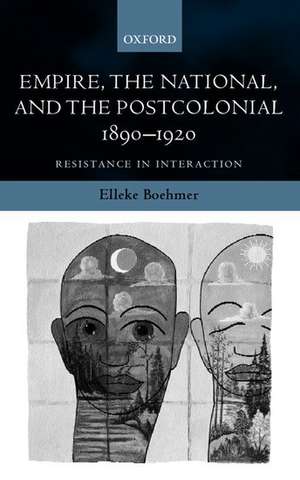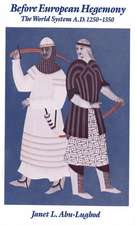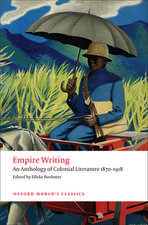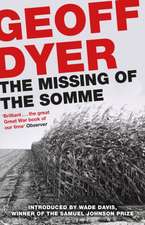Empire, the National, and the Postcolonial, 1890-1920: Resistance in Interaction
Autor Elleke Boehmeren Limba Engleză Hardback – 7 mar 2002
| Toate formatele și edițiile | Preț | Express |
|---|---|---|
| Paperback (1) | 297.50 lei 31-37 zile | |
| OUP OXFORD – 6 ian 2005 | 297.50 lei 31-37 zile | |
| Hardback (1) | 333.06 lei 31-37 zile | |
| OUP OXFORD – 7 mar 2002 | 333.06 lei 31-37 zile |
Preț: 333.06 lei
Preț vechi: 483.98 lei
-31% Nou
Puncte Express: 500
Preț estimativ în valută:
63.74€ • 69.21$ • 53.54£
63.74€ • 69.21$ • 53.54£
Carte tipărită la comandă
Livrare economică 12-18 aprilie
Preluare comenzi: 021 569.72.76
Specificații
ISBN-13: 9780198184461
ISBN-10: 0198184468
Pagini: 250
Dimensiuni: 144 x 223 x 19 mm
Greutate: 0.42 kg
Editura: OUP OXFORD
Colecția OUP Oxford
Locul publicării:Oxford, United Kingdom
ISBN-10: 0198184468
Pagini: 250
Dimensiuni: 144 x 223 x 19 mm
Greutate: 0.42 kg
Editura: OUP OXFORD
Colecția OUP Oxford
Locul publicării:Oxford, United Kingdom
Recenzii
... a timely work ... part of a growing and welcome movement towards historicization in postcolonial literary studies ... Boehmer's study is valuable in the way it foregrounds neglected texts, and suggests new possibilities for reading and novel critical perspectives on late-nineteenth and early twentieth-century literatures in English.
... combines scrupulous scholarship with awareness of current debates about the relation of postcolonial writing to modernity and modernism in order to subsidize a cultural argument with theoretical overtones.
As cultural history, the book deepens the sense of complexity that must attend any narrative of modernism, modernity, and their interrelations. It also enriches and complicates our sense of the relation between colonial and postcolonial resistance by urging recognition of the need to approach modern cultural history with a nuanced alertness to the impact of modernism on colonial writers and the impact of Empire on modernist writers.
Empire, the National, and the Postcolonial strikes an excellent balance between theory and historical documentation. Boehmer analyses new materials alongside canonical texts, making it a very original contribution to the postcolonial field. Most importantly, it decentres the monologic narrative of imperialism, whose success greatly depended upon imposing a framework of binary opposition between the centre and its peripheries. . . . The book provides us with a fresh alternative, and a possibility of reading resistance between the margins.
This formidably well-researched and carefully documented book demonstrates the strengths of a complex comparative methodology in postcolonial studies.
This latest contribution from Elleke Boehmer moves the debate into fascinating new territory.
... there is still a scarcity of work about the direct and indirect interactions between colonized spaces. Elleke Boehmer's new book opens up this area in a fascinating new way.
This book is infinitely rich in detail, but sustains it with a broad and challenging thesis. It invites us to begin to think about the Empire not only as a discrete series of colonial events linked only through their common resistance to the imperial center, but also as a network of interacting nodes in a living and shifting historical and cultural exchange with multiple routings and dimensions.
... innovative and challenging study.
Empire, the National, and the Postcolonial is Boehmer's most challenging and rewarding book to date. Her encyclopaedic knowledge and sensitivity to textual detail, which were the hallmarks of her successful Colonial and Postcolonial Literature (Oxford 1995), combine excitingly with her impressive theoretical dexterity and ambition.
Certainly this is the most conceptually sophisticated of her critical works, one which makes a significant and ground-breaking contribution to our understanding of an important period of burgeoning anti-colonial resistance.
Inspiring ... meticulously researched and gracefully written ... Throughout the book Boehmer's commitment to historical occasion and accuracy acts as a necessary counterweight to some of the abstract excesses of postcolonial theory, enabling her to be conceptually adventurous but historically responsible.
... combines scrupulous scholarship with awareness of current debates about the relation of postcolonial writing to modernity and modernism in order to subsidize a cultural argument with theoretical overtones.
As cultural history, the book deepens the sense of complexity that must attend any narrative of modernism, modernity, and their interrelations. It also enriches and complicates our sense of the relation between colonial and postcolonial resistance by urging recognition of the need to approach modern cultural history with a nuanced alertness to the impact of modernism on colonial writers and the impact of Empire on modernist writers.
Empire, the National, and the Postcolonial strikes an excellent balance between theory and historical documentation. Boehmer analyses new materials alongside canonical texts, making it a very original contribution to the postcolonial field. Most importantly, it decentres the monologic narrative of imperialism, whose success greatly depended upon imposing a framework of binary opposition between the centre and its peripheries. . . . The book provides us with a fresh alternative, and a possibility of reading resistance between the margins.
This formidably well-researched and carefully documented book demonstrates the strengths of a complex comparative methodology in postcolonial studies.
This latest contribution from Elleke Boehmer moves the debate into fascinating new territory.
... there is still a scarcity of work about the direct and indirect interactions between colonized spaces. Elleke Boehmer's new book opens up this area in a fascinating new way.
This book is infinitely rich in detail, but sustains it with a broad and challenging thesis. It invites us to begin to think about the Empire not only as a discrete series of colonial events linked only through their common resistance to the imperial center, but also as a network of interacting nodes in a living and shifting historical and cultural exchange with multiple routings and dimensions.
... innovative and challenging study.
Empire, the National, and the Postcolonial is Boehmer's most challenging and rewarding book to date. Her encyclopaedic knowledge and sensitivity to textual detail, which were the hallmarks of her successful Colonial and Postcolonial Literature (Oxford 1995), combine excitingly with her impressive theoretical dexterity and ambition.
Certainly this is the most conceptually sophisticated of her critical works, one which makes a significant and ground-breaking contribution to our understanding of an important period of burgeoning anti-colonial resistance.
Inspiring ... meticulously researched and gracefully written ... Throughout the book Boehmer's commitment to historical occasion and accuracy acts as a necessary counterweight to some of the abstract excesses of postcolonial theory, enabling her to be conceptually adventurous but historically responsible.
Notă biografică
Elleke Boehmer is Professor of Colonial and Postcolonial Studies at Nottingham Trent University, and author of Colonial Literature (1995), and three novels: Screens Against the Sky (1990), An Immaculate Figure (1993), and Bloodlines (2000).












